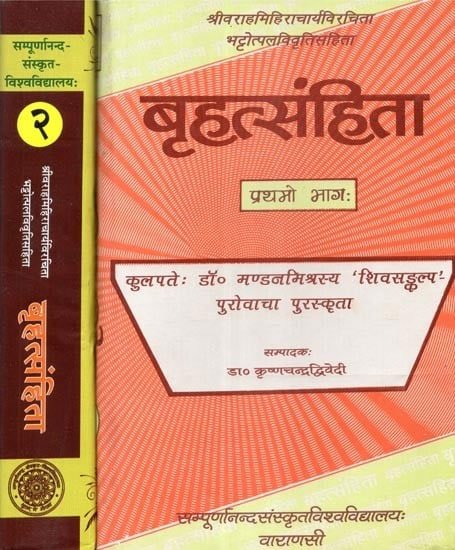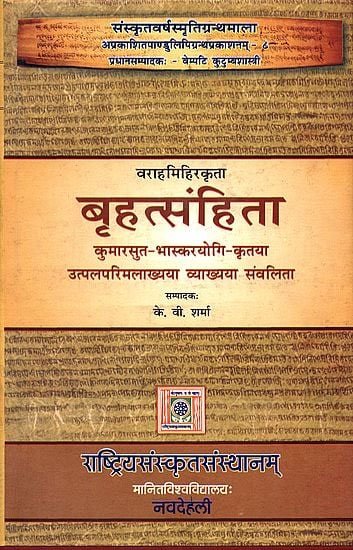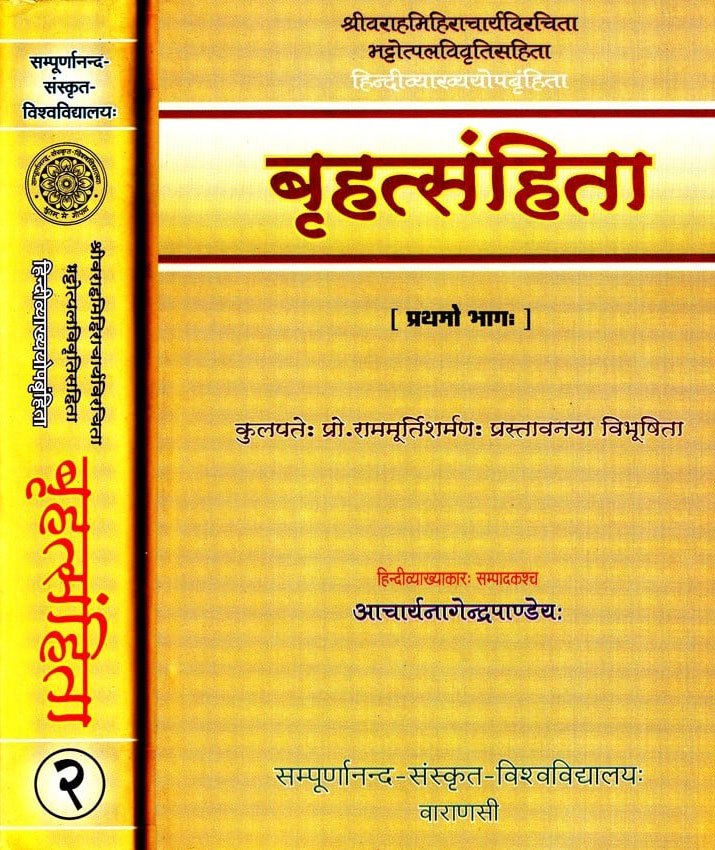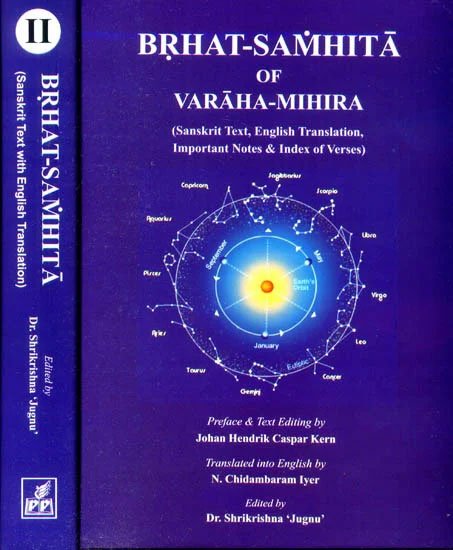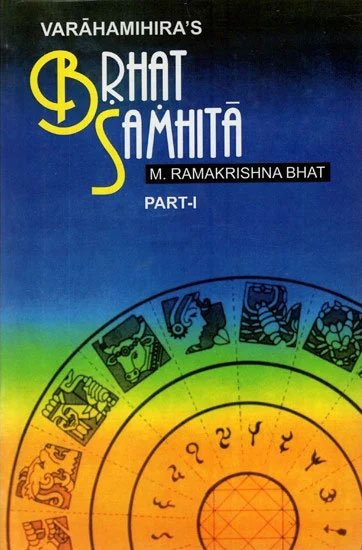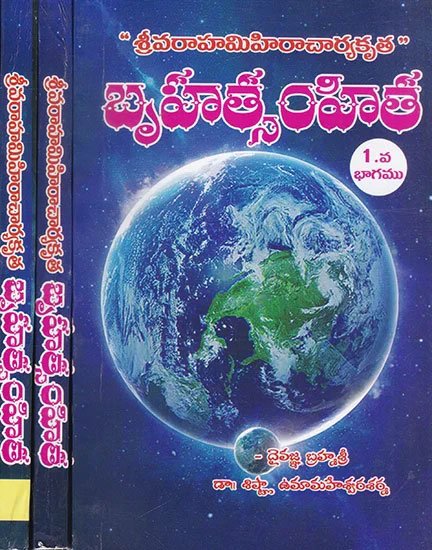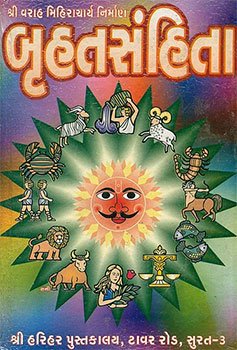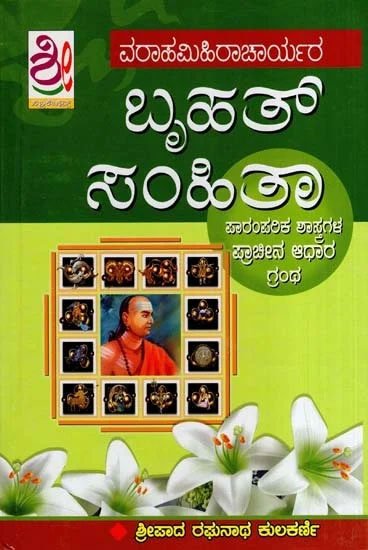Brihat-samhita [sanskrit]
26,560 words
The Sanskrit text of the Brihat-samhita from the 6th-century authored by Varaha Mihira in present-day Ujjain, India. It primarily deals with astrology and astronomy but is presented as an encyclopedia of knowledge.
Verse 8.19
रोहिण्योऽनलभं च वत्सरतनुर्नाभिस्त्वषाढद्वयं सार्पं हृत्पितृदैवतं च कुसुमं शुद्धैः शुभं तैः फलम् ।
देहे क्रूरनिपीडितेऽग्न्यनिलजं नाभ्यां भयं क्षुत्कृतं पुष्पे मूलफलक्षयोऽथ हृदये सस्यस्य नाशो ध्रुवम् ॥ १९ ॥
rohiṇyo'nalabhaṃ ca vatsaratanurnābhistvaṣāḍhadvayaṃ sārpaṃ hṛtpitṛdaivataṃ ca kusumaṃ śuddhaiḥ śubhaṃ taiḥ phalam |
dehe krūranipīḍite'gnyanilajaṃ nābhyāṃ bhayaṃ kṣutkṛtaṃ puṣpe mūlaphalakṣayo'tha hṛdaye sasyasya nāśo dhruvam || 19 ||
The Sanskrit text of Verse 8.19 is contained in the book Brihata Samhita (Sanskrit Text with Hindi Translation) by Pandit Achyutananda Jha. This book is available online or you could buy the latest edition:
Read online Buy now! The Sanskrit text by Pandit Achyutananda Jha (2001)
Glossary of Sanskrit terms
Note: This extracts Sanskrit terms and links to English definitions from the glossary, based on an experimental segmentation of verse (8.19). Some terms could be superfluous while some might not be mentioned. Click on the word to show English definitions.
Rohini, Anala, Bha, Vatsara, Tanu, Tanus, Nabhi, Tva, Ashadha, Dvayam, Dvaya, Sarpa, Hrit, Pitridaivata, Kusuma, Shuddha, Shubha, Shubh, Tad, Phala, Deha, Krura, Nipidita, Agnyanilaja, Nabhya, Bhaya, Kshutkrit, Pushpa, Mulaphala, Kshaya, Kshi, Atha, Hridaya, Sasya, Nasha, Dhruvam, Dhruva,
Analysis of Sanskrit grammar
Note: this is an experimental feature and only shows the first possible analysis of the Sanskrit text (Verse 8.19). If the system was successful in segmenting the sentence, you will see of which words it is made up of, generally consisting of Nouns, Pronouns, Verbs, Participles and Indeclinables. Click on the link to show all possible derivations of the word.
- Line 1: “rohiṇyo'nalabhaṃ ca vatsaratanurnābhistvaṣāḍhadvayaṃ sārpaṃ hṛtpitṛdaivataṃ ca kusumaṃ śuddhaiḥ śubhaṃ taiḥ phalam ”
- rohiṇyo' -
-
rohiṇī (noun, feminine)[nominative plural], [vocative plural]
- anala -
-
anala (noun, masculine)[compound], [vocative single]
- bham -
-
bha (noun, masculine)[adverb], [accusative single]bha (noun, neuter)[adverb], [nominative single], [accusative single]bhā (noun, feminine)[adverb]bhā (noun, masculine)[adverb]
- ca -
-
ca (indeclinable conjunction)[indeclinable conjunction]ca (noun, masculine)[compound], [vocative single]ca (noun, neuter)[compound], [vocative single]
- vatsara -
-
vatsara (noun, masculine)[compound], [vocative single]
- tanur -
-
tanus (noun, feminine)[compound], [adverb], [nominative single], [vocative single]tanus (noun, neuter)[compound], [adverb], [nominative single], [vocative single], [accusative single]tanu (noun, masculine)[nominative single]
- nābhis -
-
nā (noun, feminine)[instrumental plural]nābhi (noun, feminine)[nominative single]nābhi (noun, masculine)[nominative single]
- tva -
-
tu (indeclinable particle)[indeclinable particle]tva (noun, neuter)[compound], [vocative single]
- aṣāḍha -
-
aṣāḍha (noun, masculine)[compound], [vocative single]aṣāḍha (noun, neuter)[compound], [vocative single]
- dvayam -
-
dvayam (indeclinable)[indeclinable]dvaya (noun, masculine)[adverb], [accusative single]dvaya (noun, neuter)[adverb], [nominative single], [accusative single]
- sārpam -
-
sārpa (noun, masculine)[adverb], [accusative single]sārpa (noun, neuter)[adverb], [nominative single], [accusative single]sārpā (noun, feminine)[adverb]
- hṛt -
-
hṛd (noun, neuter)[compound], [adverb]hṛt (noun, masculine)[compound], [adverb], [nominative single], [vocative single]hṛt (noun, neuter)[compound], [adverb], [nominative single], [vocative single], [accusative single]
- pitṛdaivatam -
-
pitṛdaivata (noun, masculine)[adverb], [accusative single]pitṛdaivata (noun, neuter)[adverb], [nominative single], [accusative single]
- ca -
-
ca (indeclinable conjunction)[indeclinable conjunction]ca (noun, masculine)[compound], [vocative single]ca (noun, neuter)[compound], [vocative single]
- kusumam -
-
kusuma (noun, masculine)[adverb], [accusative single]kusuma (noun, neuter)[adverb], [nominative single], [accusative single]kusumā (noun, feminine)[adverb]
- śuddhaiḥ -
-
śuddha (noun, masculine)[instrumental plural]śuddha (noun, neuter)[instrumental plural]√śudh -> śuddha (participle, masculine)[instrumental plural from √śudh class 1 verb], [instrumental plural from √śudh class 4 verb]√śudh -> śuddha (participle, neuter)[instrumental plural from √śudh class 1 verb], [instrumental plural from √śudh class 4 verb]
- śubham -
-
śubha (noun, masculine)[adverb], [accusative single]śubha (noun, neuter)[adverb], [nominative single], [accusative single]śubhā (noun, feminine)[adverb]śubh (noun, feminine)[accusative single]
- taiḥ -
-
ta (noun, masculine)[instrumental plural]ta (noun, neuter)[instrumental plural]tad (noun, neuter)[instrumental plural]sa (noun, masculine)[instrumental plural]
- phalam -
-
phala (noun, masculine)[adverb], [accusative single]phala (noun, neuter)[adverb], [nominative single], [accusative single]phalā (noun, feminine)[adverb]
- Line 2: “dehe krūranipīḍite'gnyanilajaṃ nābhyāṃ bhayaṃ kṣutkṛtaṃ puṣpe mūlaphalakṣayo'tha hṛdaye sasyasya nāśo dhruvam ”
- dehe -
-
deha (noun, masculine)[locative single]deha (noun, neuter)[nominative dual], [vocative dual], [accusative dual], [locative single]
- krūra -
-
krūra (noun, masculine)[compound], [vocative single]krūra (noun, neuter)[compound], [vocative single]
- nipīḍite' -
-
nipīḍita (noun, masculine)[locative single]nipīḍita (noun, neuter)[nominative dual], [vocative dual], [accusative dual], [locative single]nipīḍitā (noun, feminine)[nominative dual], [vocative single], [vocative dual], [accusative dual]
- agnyanilajam -
-
agnyanilaja (noun, masculine)[adverb], [accusative single]agnyanilaja (noun, neuter)[adverb], [nominative single], [accusative single]
- nābhyām -
-
na (noun, masculine)[instrumental dual], [dative dual], [ablative dual]na (noun, neuter)[instrumental dual], [dative dual], [ablative dual]nā (noun, feminine)[instrumental dual], [dative dual], [ablative dual]nābhi (noun, feminine)[locative single]nābhyā (noun, feminine)[accusative single]nābhī (noun, feminine)[locative single]
- bhayam -
-
bhaya (noun, masculine)[adverb], [accusative single]bhaya (noun, neuter)[adverb], [nominative single], [accusative single]bhayā (noun, feminine)[adverb]
- kṣutkṛtam -
-
kṣutkṛt (noun, masculine)[accusative single]kṣutkṛt (noun, feminine)[accusative single]
- puṣpe -
-
puṣpa (noun, masculine)[locative single]puṣpa (noun, neuter)[nominative dual], [vocative dual], [accusative dual], [locative single]puṣpā (noun, feminine)[nominative dual], [vocative single], [vocative dual], [accusative dual]
- mūlaphala -
-
mūlaphala (noun, neuter)[compound], [vocative single]
- kṣayo' -
-
kṣaya (noun, masculine)[nominative single]kṣi (noun, feminine)[nominative plural], [vocative plural]
- atha -
-
atha (indeclinable)[indeclinable]
- hṛdaye -
-
hṛdaya (noun, masculine)[locative single]hṛdaya (noun, neuter)[nominative dual], [vocative dual], [accusative dual], [locative single]hṛdayā (noun, feminine)[nominative dual], [vocative single], [vocative dual], [accusative dual]
- sasyasya -
-
sasya (noun, masculine)[genitive single]sasya (noun, neuter)[genitive single]
- nāśo* -
-
nāśa (noun, masculine)[nominative single]
- dhruvam -
-
dhruvam (indeclinable)[indeclinable]dhruva (noun, masculine)[adverb], [accusative single]dhruva (noun, neuter)[adverb], [nominative single], [accusative single]dhruvā (noun, feminine)[adverb]
Other editions:
Also see the following editions of the Sanskrit text or (alternative) English translations of the Verse 8.19
Brhatsamhita with the Commentary of Bhattotpala
by Krishna Chandra Dwivedi (2016)
Publisher: Sampurnanand Sanskrit University; 1229 pages;
Buy now!
Brihat Samhita with the Commentary of Utpalapatimala of Yogisvara
by K. V. Sharma (2012)
Publisher: Rashtriya Sanskrit Sansthan, Janakpuri; 754 pages; ISBN-10; 8186111360; ISBN-13: 9788186111369
Buy now!
Brihat Samhita (Hindi Translation)
by K. V. Sharma (2002)
Publisher: Sampurnanand Sanskrit University; 2359 pages; ISBN-13: 9789387890008.
Buy now!
Brhat Samhita (English translation)
by N. Chidambaram Iyer (2022)
Publisher: Parimal Publication Pvt. Ltd.; 801 pages; Edited by Dr. Shrikrishna Jugnu; ISBN-10: 8171104215; ISBN-13: 9788171104215.
Buy now!
Brhat Samhita (English with notes)
by M. Ramakrishna Bhat (2010)
Publisher: Motilal Banarsidas Publishers Pvt. Ltd.; 1155 pages; ISBN-10: 8120810600; ISBN-13: 9788120810600.
Buy now!
Brhat Samhita (Telugu translation)
by Sishtla Umamaheswara Sharma (2020)
Publisher: Mohan Publications, Andhra Pradesh; 846 pages.
Buy now!Preview of verse 8.19 in Kannada sript:
ರೋಹಿಣ್ಯೋಽನಲಭಂ ಚ ವತ್ಸರತನುರ್ನಾಭಿಸ್ತ್ವಷಾಢದ್ವಯಂ ಸಾರ್ಪಂ ಹೃತ್ಪಿತೃದೈವತಂ ಚ ಕುಸುಮಂ ಶುದ್ಧೈಃ ಶುಭಂ ತೈಃ ಫಲಮ್ ।
ದೇಹೇ ಕ್ರೂರನಿಪೀಡಿತೇಽಗ್ನ್ಯನಿಲಜಂ ನಾಭ್ಯಾಂ ಭಯಂ ಕ್ಷುತ್ಕೃತಂ ಪುಷ್ಪೇ ಮೂಲಫಲಕ್ಷಯೋಽಥ ಹೃದಯೇ ಸಸ್ಯಸ್ಯ ನಾಶೋ ಧ್ರುವಮ್ ॥ ೧೯ ॥
Brhat Samhita (Gujarati translation)
by - (2000)
Publisher: Shree Harihar Pustakalay, Surat; Author: Shri Varahamihira Acharya (શ્રી વરાહમિહીરાચાર્ય); 432 pages.
Buy now!Preview of verse 8.19 in Gujarati sript:
રોહિણ્યોઽનલભં ચ વત્સરતનુર્નાભિસ્ત્વષાઢદ્વયં સાર્પં હૃત્પિતૃદૈવતં ચ કુસુમં શુદ્ધૈઃ શુભં તૈઃ ફલમ્ ।
દેહે ક્રૂરનિપીડિતેઽગ્ન્યનિલજં નાભ્યાં ભયં ક્ષુત્કૃતં પુષ્પે મૂલફલક્ષયોઽથ હૃદયે સસ્યસ્ય નાશો ધ્રુવમ્ ॥ ૧૯ ॥
Brhat Samhita (Kannada translation)
by Sripada Raghunatha Kulkarni (2021)
Publisher: Srinidhi Publications, Bangalore; 668 pages with illustrations.
Buy now!Preview of verse 8.19 in Kannada sript:
ರೋಹಿಣ್ಯೋಽನಲಭಂ ಚ ವತ್ಸರತನುರ್ನಾಭಿಸ್ತ್ವಷಾಢದ್ವಯಂ ಸಾರ್ಪಂ ಹೃತ್ಪಿತೃದೈವತಂ ಚ ಕುಸುಮಂ ಶುದ್ಧೈಃ ಶುಭಂ ತೈಃ ಫಲಮ್ ।
ದೇಹೇ ಕ್ರೂರನಿಪೀಡಿತೇಽಗ್ನ್ಯನಿಲಜಂ ನಾಭ್ಯಾಂ ಭಯಂ ಕ್ಷುತ್ಕೃತಂ ಪುಷ್ಪೇ ಮೂಲಫಲಕ್ಷಯೋಽಥ ಹೃದಯೇ ಸಸ್ಯಸ್ಯ ನಾಶೋ ಧ್ರುವಮ್ ॥ ೧೯ ॥
![Brihat-samhita [sanskrit] - book cover](/uploads/a/Brihat-Samhita-Sanskrit.jpg)
